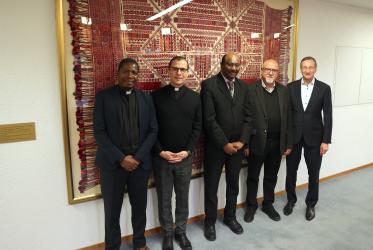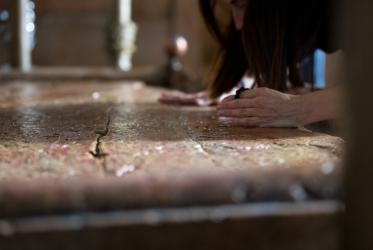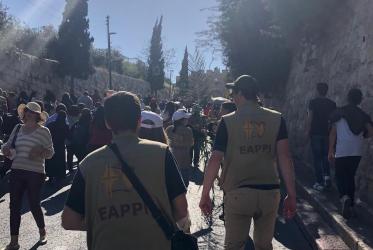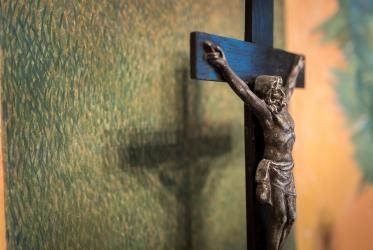Pnina Pfeuffer, an Orthodox Jewish woman and mother of two, manages a non-governmental organization related to social activism and advocacy for education and women’s rights in the Orthodox community. She also speaks to ecumenical accompaniers from the World Council of Churches Ecumenical Accompaniment Programme in Palestine and Israel about Jerusalem and human rights. Below, Pfeuffer, from Jerusalem, shares her family’s traditions related to Pesach, which this year is being celebrated from 5-13 April.
“During the holiday don’t eat leavened bread,” Pfeuffer said. “My family is Ashkenazi so we stop eating rice or corn, too—which is not religiously prohibited but it is a custom that we observe.”
Before Pesach, her family begins with lots of preparation and cleaning. “We go through every room in the house with a candle after we turn the lights off, to make sure that everything is clean and there is no inappropriate food,” she said. “We do so on the night before Pesach.”
Pfeuffer’s two daughters, ages 17 and 18, help with the preparations and with using the candles to ensure that the home is ready for Pesach. “The girls help me cover the counters, and we clean with hot water and bleach,” said Pfeuffer. “We clean my fridge and cabinets, after I get rid of the old food and we make sure there are no crumbs.”
Pesach starts at sundown, in the previous day—around 11 am—the family stops eating any type of bread. On Passover night, they begin with a special prayer and liturgy and 10 different steps of prayer. “We also prepare a special meal served with wine, herbs, and one egg that reminds us of the temple and the concept of sacrifice,” Pfeuffer explained. “We also eat sweet dip in which we put the herbs.”
“It is a night that reminds us of what it was like to be slaves in Egypt—and of our freedom,” she said. “On the morning of Pesach, we burn the food that we had kept from before Pesach—it is the custom to burn the food we are not allowed to have during the holiday.”
Pfeuffer said she knows that Jerusalem is a divided city, and she has no Palestinian neighbors in the area in which she lives. “I know that Muslims and Christians are here,” she said. “People live side-by-side but they do not interact socially,” she said. “We have cordial relations but we do not really know each other—like we do not send our children to the same schools.”
She wishes Jerusalem was less divided and contested. "With the right to worship—just like Jews have that right—we should be careful not to make it difficult for others to come and worship,” she said. “All groups should be allowed to come and worship whether or not we have a political solution.”
She often speaks with ecumenical accompaniers about how to interact with Israeli society. “I give them an idea about my way of life, rabbinical leadership, conflict between religions, and life and everyday expectations in Jerusalem between the different nationalities and religions,” she said. “I am from a big minority of religious and ultra-religious Jews, and our numbers are growing.”
She also wants the ecumenical accompaniers to know that she works for equal rights for women in her community. “The ecumenical accompaniers are important,” she said. “They are documenting what happens around here and sending the information to people who want to find out.”






